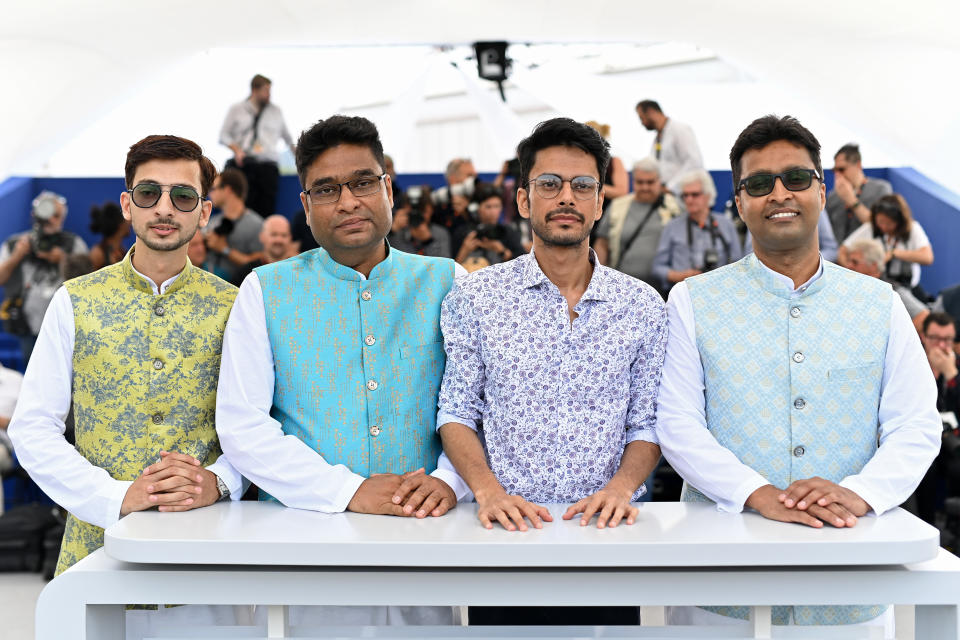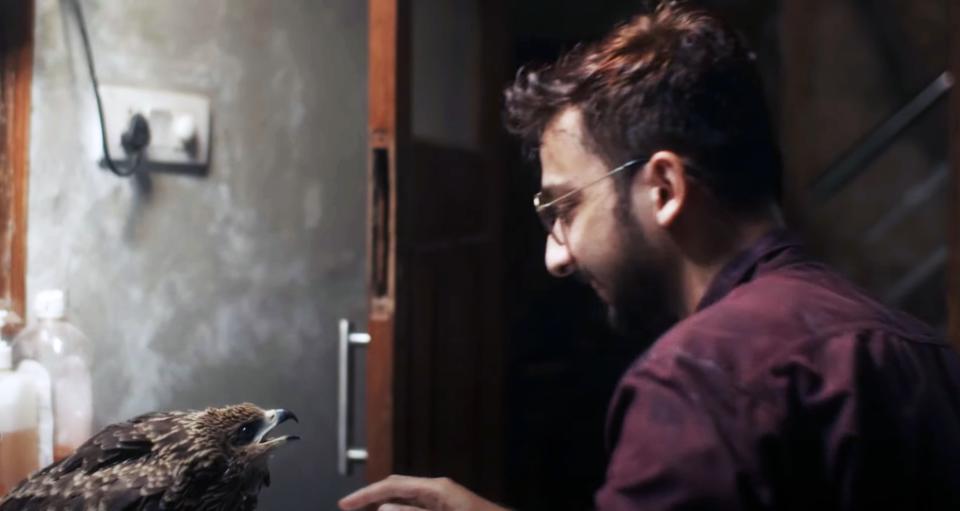‘All That Breathes’ Director Shaunak Sen On Soaring With Birds Of Prey To Create A “Sensorium” Of Life In Delhi And Spotlight The City’s Pollution Crisis
- Oops!Something went wrong.Please try again later.
- Oops!Something went wrong.Please try again later.

The skies over Delhi, India, where All That Breathes director Shaunak Sen lives, do not present an inviting picture: dull, gray and dense with pollution. But amid the particulate, one image of beauty stands out — the graceful, effortless black kite, a bird of prey, floating above in copious numbers. Sen’s documentary descends from those airy heights to a subterranean space where brothers Nadeem and Saud and their trusty assistant Salik care for black kites and other birds harmed by the city’s caustic pollution. Already a winner at Sundance and Cannes, All That Breathes has earned Sen his first Oscar nomination.
DEADLINE: What has the journey been like for you from Sundance 2022 to now?
More from Deadline
SHAUNAK SEN: I’ve never had a year like this in my life. My girlfriend said the other day that, apparently, my favorite word these days is “discombobulated”. And I said, “There’s clearly a reason for it.” I don’t know anybody who’s had as many consecutive nights in hotel rooms or has had as many flights stacked together and all of that. It’s not like a simple-minded “Whoa, wonderful!” sort of a thing, because it also takes something… It’s been up and down-y, and rollercoaster-y, but very nice, of course.
DEADLINE: Take me back to the origins of the film. Did it start with seeing the birds dropping from the sky?
SEN: No, I think it started with a need to engage with the air or deal with the air. In Delhi, everybody’s preoccupied with the air and the almost sentient creepiness that it’s accrued in recent years. I started with this interest in the air and an interest in human/ non-human entanglement, philosophically speaking. And every time you look up at the gray sky and you see these lazy black dots gliding in the sky, you feel something. And I wanted to do something on that texture or tone of life, a kind of sensorium of life in Delhi.
In a way, Nadeem and Saud provided an embodied and incredible text through which I could sort of open up the film into a lot of issues I was interested in. So, initially, there’s this kind of a conceptual force field that you’re animated by. And then, after that, the sheer blunt force of the irreducible specificity of the brothers themselves and their lives takes over. But the scaffolding of what you’ve started with, the quiet blow of that, still underwrites some of that world you encounter. It’s really about then blending those two things together, and that’s how the film began.

DEADLINE: Do you have a sense of how the film has impacted Nadeem, Saud and Salik?
SEN: I think on multiple registers. For one, they’ve been traveling a lot. Nadeem, Saud and Salik came to Cannes. Since then, Nadeem has gone to multiple film festivals, everything from Kraków to Australia to the New York Film Forum, the BAFTAs… Nadeem and Saud are coming for the Oscars. So, it’s a crazy time. There’s more media attention on their [rehabilitation] work than there ever has been. In terms of material help, our producers have very kindly supported their [bird] hospital for a year to come. So, there’s some degree of material alleviation. But having said that, one shouldn’t simple-mindedly overstate — it’s not like a film can, in one fell swoop, change a whole extended family’s life. All I hope for is some kind of an oasis. Now that the film is on HBO, hopefully, the trickle of donations [to the hospital] should swell into a stream. That’s what we’re hoping for.
DEADLINE: Have you noticed a difference in the volume of reactions to the film since it debuted on HBO? Obviously, that increases the audience significantly.
SEN: Oh, 100 percent. I’m constantly getting tagged on social media, so that’s usually my only index to figure things out. You keep thinking that you’re making stuff and sending messages in bottles to the wide expanse of the world, and then you only expect a few life rafts. But then, when there’s a full opera of a feedback loop of things, that always takes you by surprise. I’m now in a perpetual state of mild surprise.
DEADLINE: In the screenings you’ve done around the world, are there particular moments or interactions with people who’ve seen the film that stand out to you?
SEN: Every time somebody comes and says they love the film, it’s meaningful irrespective of how repetitious it could play. It’s not a diminishing graph at all. Having said that, I love it when people say things like, “I really Googled the brothers after that.” Every time I feel like an audience member has stepped out and looked up at the sky, I feel a bit happy because what it does is it enchants the sky and enchants birds, which is great. I also personally and selfishly feel happy every time somebody uses the word “cinematic.”
DEADLINE: That it is. There are so many beautiful images in the film, like the shot of a discarded bag that has a little bit of water pooled in it. Then we see the reflection of an airplane move over it.
SEN: To a large degree, that’s the incredible magical skill of the cinematographers Ben Bernhard and Riju Das. But more than anything else, so often, what we call beauty is a function of time. Because if you keep turning up and shooting, at some point, life rewards you with accidents. We have our long track shots ready and if out of the blue, a deflection of something comes, etcetera, that’s great. So much of the documentary is a kind of a radical embrace of the un-scriptedness of the world. I think a large part of what you are describing as beautiful is really a function of time.
DEADLINE: I’m wondering what your family’s reaction has been to the extraordinary embrace of your film.
SEN: My father passed away very suddenly in the middle of the film. That actually, I believe, gave the film a kind of elegiac, somber quality. Which is why this sense of it being a fever dream ever since is, for me personally, always heightened and intense. My mom, of course, started from stultified skepticism to that skepticism slowly thawing and now is in grudging recognition of it.

DEADLINE: Why do you say “grudging” recognition of it? Are you suggesting —
and I don’t want to read too much into it — that maybe your mother’s goal in life wasn’t to see you become a filmmaker?
SEN: No, my parents were always incredibly supportive of whatever I wanted to do. And everything I’ve done is because they’ve formed a subsurface of my life. But all well-meaning parents are a bit skeptical if their child says they’re going to make a nonfiction film about birds that’ll take at least three years. Even if you had a lot of confidence in your child’s ability, you’d be a bit skeptical.
DEADLINE: That’s fair. You’ve noted previously that while shooting the film, you kept a respectful distance from the black kites. It wasn’t like you said, “Let me pet the bird,” or that sort of thing. I imagine you haven’t spent much time with birds in the past year because of your travels. But is it pretty consistent that, at least in terms of black kites, you wouldn’t want to be locked in a small room with them?
SEN: I mean, they’re not the kind of cute songbirds that elicit petting. You’d have to be an atypical individual to just randomly go up to a black kite and pet it. But in terms of birds, I’m staying in this house in the Hollywood Hills in LA right now, which has a tiny garden patch. I was just looking at I don’t know what bird because I’m not familiar with the avian ecosystem here, but a bird that reminded me of the warbler in Asia — a grayish bird. It immediately opened familiar rabbit holes from the past where I kept watching it. You start enrolling yourself into the passing of time of the bird itself.
You feel like, is it in a stage of play right now?
Because, clearly, it would’ve eaten for the day. It’s the last bit of the day for it and so on. You start going into all of that, and then I think about how most animals in nature are always in a state of almost crippling hunger, and how the brothers [Nadeem and Saud] are able to maintain this dance between looking at the revitalizing, magisterial aspects of nature while also keeping a tab on the kind of crushing agnostic indifference of it — those two things are simultaneous. And they’re able to keep a tab on it. So just that kind of stuff. Which is all to say that the birds haven’t receded from my mind at all.

DEADLINE: India, of course, has a huge cinematic tradition. It’s a very large nation, and I suspect there is a great deal of pride in what you have accomplished with this film.
SEN: I, unfortunately, haven’t been home for too long to be able to soak it all in and verify the exact scale of it. But from what the social media ether tells me, there is that. Of course, we are still awaiting the release [of the film] in India, so hopefully, that should be decided soon. There’s some degree of restlessness to see the film. But yeah, I don’t spend too much time thinking about the intricacies of pride or not.
DEADLINE: Are you feeling ready to attend the Academy Awards next month? Do you know what you’re going to wear for example?
SEN: I emphatically do not, and I will defer that decision. I will delay that decision until the critical mass of urgency reaches a point where it’s become undelayable; it’s not put-downable after that.
Best of Deadline
Sign up for Deadline's Newsletter. For the latest news, follow us on Facebook, Twitter, and Instagram.

